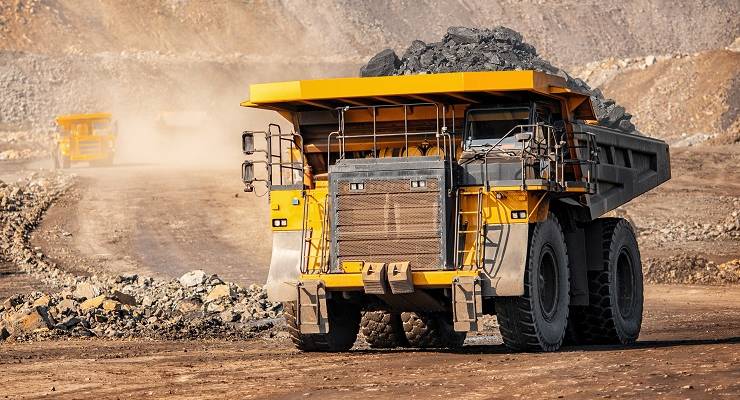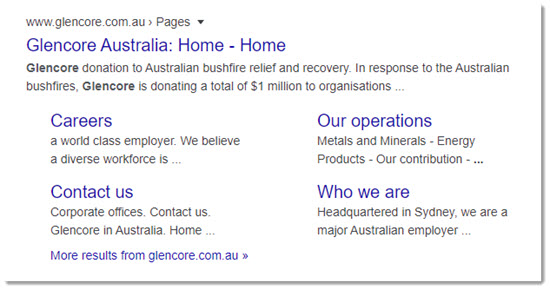
Faced with mounting criticism over their contribution to climate change, mining companies are trying to turn public perception.
Glencore Australia, which, in part, mines and exports coal, has “optimised” its Google search result to boast about its $1 million donation to Australian bushfire relief and recovery.

But there’s more to it than splashing money around.
The company has also been promoting some of its tweets since the bushfire season began, trumpeting the idea that it produces commodities that “advance everyday life around the world”.
BHP, Rio Tinto and Gold Fields have all made bushfire donations into the millions. Rio Tinto — which exited the coal industry in 2018 — went an extra step and announced it would pay full leave entitlements to employees who were also volunteer firefighters.
According to Christopher Wright, professor of organisational studies at the University of Sydney, the strategy is clearly a response to mounting criticism of the mining industry and public concern about climate change amidst the bushfire season.
But it doesn’t always seem to wash. Twitter posts promoting BHP’s sustainability efforts have been met with angry comments and photos of the bushfires.

One user responded to a post promoting Glencore’s donations to farmers last December by calling out the company’s complicity in tough farming conditions.
The public backlash against mining companies is not only in response to this summer’s bushfire crisis.
A confidential study conducted by the Queensland Resources Council in 2018 seen by Crikey found “a decline in positive sentiment among the public [towards the mining industry], despite the recent uplift in commodity prices and a more positive outlook for the future of the sector”.
Professor Wright told Crikey that mining companies had been on the front foot for years, sponsoring community sports clubs and local initiatives, and working with politicians.
“They are aware there is growing public concern about climate change and the contribution fossil fuels make to that, and that there are more local concerns about environmental destruction [as a result of mining],” he said.
“So a response is to say: ‘We are the good guys! We donated all this money to worthy causes'”.
But Wright isn’t sure splashing cash around is going to pay off for the industry this time.
Wyong Public Hospital rejected a $15 million donation from the Wyong Coal Wallarah 2 Project this week due to “current community sentiment and potential public health effects”, allegedly telling Wyong Coal it would be like “taking money from a tobacco company”.
Dan Gocher, director of Climate and Environment at the Australasian Centre for Corporate Responsibility, told Crikey that it was clear from their media silence that the usually-active NSW Minerals Council and QLD Resources Council were “definitely feeling it … and happy to sit this one out for a while”.
“We are also expecting to see some sort of public relations or advertising campaign in response, and our suspicion is it would focus on narratives that [the mining industry] has found most effective [for boosting public support], like jobs, royalties and taxation contributions, and so on,” Gocher said.
“It’s only a matter of time”.








Wyong . . . Public Hospital Of The Year 2020.
Imagine if they’d been paying their fair share of tax (instead of letting us make up the short-fall) for all these years?
“Lean coal”?
The enemy here is coal mining. An environmental voice that sprays against the entire mining industry ensures it has no effect at all. After all, we want to buy cars of steel mined in Australia (Pilbara WA), with batteries of lithium mined in Australia (at Greenbushes WA), and there’s our beer cans, and so on.
It might be productive to engage with the rest of the mining industry on other decarbonising steps. Rio Tinto have investigated non-carbon iron smelting. All open cut mines could use electrical cutters and belts rather than diesel powered diggers and trucks. And so on. Where there are decarbonising efforts in the industry, perhaps Crikey could pay attention. At the end of the day, we are on the same side.
At 15 kWhrs/kg smelting aluminium using coal fired power is problematic I would say. I suspect that the coal assets that Rio own(ed?), which feed the Gladstone power station, which Rio also has a stake in, does not cleanly excise culpability. It is not just coal mining, it is coal burning as well. Rio also spruik carbon free aluminium smelting. It is one thing to produce the glossies promoting exciting new horizons for the industry, quite another putting it in production and start backing off the CO2 emissions from their endeavors now.
So royalties are a “contribution to the community”? I thought they were a modest payment for resources owned by The Australian people.
My, haven’t Rio changed their tune. As an ex Rio employee for about two decades I can distinctly remember Rio refusing to grant leave to one of the local Bush Fire Captains for any Bush Fire Brigade duties.